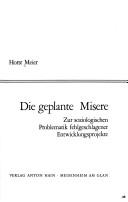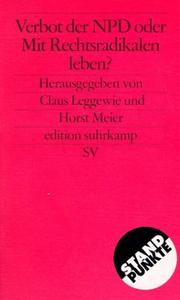| Listing 1 - 8 of 8 |
Sort by
|
Digital
ISBN: 9783642308208 Year: 2013 Publisher: Berlin, Heidelberg Springer
Abstract | Keywords | Export | Availability | Bookmark
 Loading...
Loading...Choose an application
- Reference Manager
- EndNote
- RefWorks (Direct export to RefWorks)
“An Industrial Product-Service System is characterized by the integrated and mutually determined planning, development, provision and use of product and service shares including its immanent software components in Business-to-Business applications and represents a knowledge-intensive socio-technical system.” – Meier, Roy, Seliger (2010) Since the first conference in 2009, the CIRP International Conference on Industrial Product-Service Systems has become a well-established international forum for the review and discussion of advances, research results and industrial improvements. Researchers from all over the world have met at previous IPS² conferences in Cranfield (2009), Linköping (2010), Braunschweig (2011) and Tokyo (2012). In 2013, the 5th CIRP International Conference on Industrial Product-Service Systems is held in Bochum. Important topics of IPS² research presented at the conference are: planning and development, sustainability, business models, operation, service engineering, knowledge management, ICT, modeling and simulation, marketing and economic aspects as well as the role of the human in IPS².
Economic production --- Materials sciences --- Applied physical engineering --- Physical distribution --- Production management --- innovatiemanagement --- DFMA (design for manufacture and assembly) --- SCM (supply chain management) --- duurzaamheid --- productie --- duurzame ontwikkeling --- logistiek --- kwaliteitscontrole --- ingenieurswetenschappen

ISBN: 3445008426 Year: 1971 Publisher: Meisenheim am Glan Hain
Abstract | Keywords | Export | Availability | Bookmark
 Loading...
Loading...Choose an application
- Reference Manager
- EndNote
- RefWorks (Direct export to RefWorks)
Economic assistance --- Technical assistance --- Case studies --- Developing countries --- Research
Book
ISBN: 3662480182 Year: 2017 Publisher: Berlin, Heidelberg : Springer Berlin Heidelberg : Imprint: Springer Vieweg,
Abstract | Keywords | Export | Availability | Bookmark
 Loading...
Loading...Choose an application
- Reference Manager
- EndNote
- RefWorks (Direct export to RefWorks)
Im zweiten Buch des Sonderforschungsbereichs Transregio 29 „Engineering hybrider Leistungsbündel – dynamische Wechselwirkungen von Sach- und Dienstleistungen in der Produktion“ wird die Entwicklung von Engineeringmethoden zusammengefasst, bei welchen die Integration der entstandenen Werkzeuge und die Berücksichtigung der Dynamik im HLB-Lebenszyklus durch flexible und wandlungsfähige Geschäftsmodelle sowie die Robustheit hybrider Leistungsbündel in der Erbringung im Fokus standen. Darüber hinaus wird der Transfer ausgewählter Forschungsergebnisse in die industrielle Praxis beschrieben. Industrielle Produkt-Service Systeme stellen ein nutzenorientiertes Produktverständnis dar, in dem Sach- und Dienstleistungsanteile über den gesamten Lebenszyklus in integrierter und sich gegenseitig determinierender Form entwickelt und betrieben werden. Dieser erweiterte Lösungsraum ermöglicht das Angebot innovativer Geschäftsmodelle, welche Verfügbarkeit oder Ergebnisse garantieren und somit zu einer deutlich verbesserten Vermarktung im Maschinen- und Anlagenbau führen. Die Herausgeber Professor Dr.-Ing. Horst Meier, Jahrgang 1951, studierte Fertigungstechnik an der Fachhochschule Lippe und an der TU Berlin. 1981 promovierte er an der TU Berlin und war anschließend als Leiter der Abteilung NC-Technik am Institut für Produktionsanlagen und Konstruktionstechnik (IPK) der Fraunhofer-Gesellschaft in Berlin tätig. 1985 wechselte er als Gesamtentwicklungsleiter zur Schleicher GmbH & Co. Relaiswerke KG Berlin, wo er 1986 zum Geschäftsführer und Leiter des Bereichs Automatisierungssysteme bestellt wurde. Von 1995 bis 1999 war er Inhaber des Lehrstuhls Automatisierungstechnik der Brandenburgischen TU Cottbus. Von 1999 bis 2014 leitete er den Lehrstuhl für Produktionssysteme an der Ruhr-Universität Bochum. Professor Dr. h. c. Dr.-Ing. Eckart Uhlmann, Jahrgang 1958, studierte Maschinenbau an der TU Berlin und war dort von 1986 bis 1994 Wissenschaftlicher Mitarbeiter und Oberingenieur im Bereich Fertigungstechnik am Institut für Werkzeugmaschinen und Fabrikbetrieb (IWF). Nach seiner Promotion war er als Bereichsleiter für Forschung, Entwicklung, Anwendungstechnik und Patentwesen sowie ab 1995 auch als Prokurist in der Firmengruppe Hermes Schleifmittel GmbH & Co., Hamburg, tätig. 1997 übernahm Professor Uhlmann die Leitung des Fraunhofer-Instituts für Produktionsanlagen und Konstruktionstechnik (IPK) sowie die Leitung des Fachgebiets Werkzeugmaschinen und Fertigungstechnik am IWF der TU Berlin im Produktionstechnischen Zentrum Berlin.
Engineering economy. --- Sales management. --- Engineering Economics, Organization, Logistics, Marketing. --- Sales/Distribution. --- e-Commerce/e-business. --- Economy, Engineering --- Engineering economics --- Industrial engineering --- Management, Sales --- Industrial management --- Marketing --- Selling --- Engineering economics. --- E-commerce. --- Cybercommerce --- E-business --- E-commerce --- E-tailing --- eBusiness --- eCommerce --- Electronic business --- Internet commerce --- Internet retailing --- Online commerce --- Web retailing --- Commerce --- Information superhighway
Book
ISBN: 3498038826 Year: 1995 Publisher: Reinbek bei Hamburg Rowohlt
Abstract | Keywords | Export | Availability | Bookmark
 Loading...
Loading...Choose an application
- Reference Manager
- EndNote
- RefWorks (Direct export to RefWorks)

ISBN: 3518122606 Year: 2002 Publisher: Frankfurt am Main Suhrkamp
Abstract | Keywords | Export | Availability | Bookmark
 Loading...
Loading...Choose an application
- Reference Manager
- EndNote
- RefWorks (Direct export to RefWorks)
Political philosophy. Social philosophy --- Political parties --- Germany
Book
ISBN: 1280793511 9786613703903 3642252699 Year: 2012 Publisher: Berlin : Springer Vieweg,
Abstract | Keywords | Export | Availability | Bookmark
 Loading...
Loading...Choose an application
- Reference Manager
- EndNote
- RefWorks (Direct export to RefWorks)
Das Ziel hybrider Leistungsbündel (HLB) ist die Etablierung eines innovativen, nutzenorientierten Produktverständnisses von Sach- und Dienstleistung. Dieses Produktverständnis betrachtet die Sach- und Dienstleistungsanteile in integrierter und sich gegenseitig determinierender Form als hybride Leistungsbündel und führt zu einem erweiterten Lösungsraum, in dem aus der integrierten Betrachtung von Sach- und Dienstleistungsanteilen Innovationen entstehen. Dieser erweiterte Lösungsraum führt zu einer deutlich verbesserten Vermarktung hochkomplexer Anlagen, die durch die Integration von Sach- und Dienstleistungsanteilen durch den Kunden optimal zu nutzen sind. Im Rahmen des Sonderforschungsbereichs „Engineering hybrider Leistungsbündel“ wurden neue Methoden und Werkzeuge zur gemeinsamen Entwicklung von Sach- und Dienstleistungen erarbeitet. Das Buch umfasst den gesamten Lebenszyklus von der Planung und Entwicklung bis zur Erbringung und Nutzung.
Engineering design. --- Industrial engineering. --- Production engineering. --- Engineering economics. --- Engineering economy. --- Application software. --- Engineering Design. --- Industrial and Production Engineering. --- Engineering Economics, Organization, Logistics, Marketing. --- Computer Applications. --- Service industries. --- Manufacturing industries.
Book
ISBN: 3642438466 3642308198 3642308201 9783642308192 Year: 2013 Publisher: Berlin ; London : Springer,
Abstract | Keywords | Export | Availability | Bookmark
 Loading...
Loading...Choose an application
- Reference Manager
- EndNote
- RefWorks (Direct export to RefWorks)
“An Industrial Product-Service System is characterized by the integrated and mutually determined planning, development, provision and use of product and service shares including its immanent software components in Business-to-Business applications and represents a knowledge-intensive socio-technical system.” – Meier, Roy, Seliger (2010) Since the first conference in 2009, the CIRP International Conference on Industrial Product-Service Systems has become a well-established international forum for the review and discussion of advances, research results and industrial improvements. Researchers from all over the world have met at previous IPS² conferences in Cranfield (2009), Linköping (2010), Braunschweig (2011) and Tokyo (2012). In 2013, the 5th CIRP International Conference on Industrial Product-Service Systems is held in Bochum. Important topics of IPS² research presented at the conference are: planning and development, sustainability, business models, operation, service engineering, knowledge management, ICT, modeling and simulation, marketing and economic aspects as well as the role of the human in IPS².
Concurrent engineering -- Congresses. --- Production engineering -- Congresses. --- Production management -- Congresses. --- Civil & Environmental Engineering --- Engineering & Applied Sciences --- Civil Engineering --- Production management --- Factory management --- Factories --- Management of factories --- Shop management --- Management --- Engineering. --- Management. --- Industrial management. --- Production management. --- Engineering design. --- Quality control. --- Reliability. --- Industrial safety. --- Engineering Design. --- Innovation/Technology Management. --- Quality Control, Reliability, Safety and Risk. --- Operations Management. --- Industrial accidents --- Industries --- Job safety --- Occupational hazards, Prevention of --- Occupational health and safety --- Occupational safety and health --- Prevention of industrial accidents --- Prevention of occupational hazards --- Safety, Industrial --- Safety engineering --- Safety measures --- Safety of workers --- Accidents --- System safety --- Dependability --- Trustworthiness --- Conduct of life --- Industrial engineering --- Reliability (Engineering) --- Sampling (Statistics) --- Standardization --- Quality assurance --- Quality of products --- Design, Engineering --- Engineering --- Industrial design --- Strains and stresses --- Manufacturing management --- Industrial management --- Business administration --- Business enterprises --- Business management --- Corporate management --- Corporations --- Industrial administration --- Management, Industrial --- Rationalization of industry --- Scientific management --- Business --- Industrial organization --- Administration --- Industrial relations --- Organization --- Construction --- Industrial arts --- Technology --- Prevention --- Design --- System safety. --- Safety, System --- Safety of systems --- Systems safety --- Industrial safety --- Systems engineering
Digital

ISBN: 9783839414507 9783837614503 Year: 2014 Publisher: Bielefeld transcript Verlag
Abstract | Keywords | Export | Availability | Bookmark
 Loading...
Loading...Choose an application
- Reference Manager
- EndNote
- RefWorks (Direct export to RefWorks)
| Listing 1 - 8 of 8 |
Sort by
|

 Search
Search Feedback
Feedback About UniCat
About UniCat  Help
Help News
News